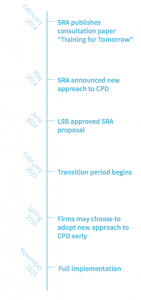On Monday 9th February, the LSB finally approved the SRA’s new approach to CPD, announced 21st May 2014.
In a letter — sent to Paul Philip, Chief Executive of the SRA, and buried on the LSB website — LSB Chief Executive, Richard Moriarty writes:
Please find enclosed our final decision notice granting the SRA’s application for approval of changes to regulatory arrangements relating to continuous professional development (CPD) and other miscellaneous changes.
The changes have been approved in full. The LSB welcomes the move from a prescriptive regulatory arrangement for CPD, currently based on arbitrary hours, to a more outcomes focussed framework that places responsibility on firms and solicitors to manage their continuing competence. We recognise that this policy has been the subject of lengthy review, development and consultation by the SRA.
Whilst supporting the SRA’s overall aim, we are also mindful that the intended benefits will only be fully realised if the new arrangements are effectively implemented. We would like to make two observations in this respect.
First, we were pleased to see that the SRA will be putting in place active review and evaluation processes, including for the opt-in period. As the SRA has acknowledged, the change is a big cultural shift for the SRA’s regulated community. In addition, the Legal Services Consumer Panel has said that the effectiveness of the approach in delivering competent services will depend on the capability of the SRA’s monitoring and supervision framework. It is therefore essential the SRA is able to know how well the changes are working in practice and to address any emerging issues both at a macro level and at the level of individual solicitors and firms.
Second, we welcome that the SRA’s post-implementation review will look at cost impacts on solicitors and firms. While outcomes focused measures generally help to reduce unnecessary burdens for business, it is important that these changes are supported by clear and effective communication to minimise any indirect costs that might arise for the regulated community from any uncertainty and confusion.
What are the important changes to the regulations?
Regulation 3.1 of the SRA Training Regulations 2011 Part 3 – CPD Regulations shall be amended as follows:
You must:
(a) undertake 16 hours of CPD during each complete CPD year in legal practice or employment in England and Wales; or
(b) consider and undertake the learning and development you deem necessary to ensure your ongoing competence and that you are in a position to provide a proper standard of service to your clients.”
For these purposes, the SRA has also amended the guidance note to regulation 8 to define what constitutes CPD under the new scheme:
(a) structured training, coaching or mentoring sessions;
(b) live or recorded webinars;
(c) writing onlaw or practice, for example law books,journals, publications for clients, client ‘s own publications, newspapers and magazines, online or in print:
(d) structured work shadowing schemes with clear aims and objectives and requiring feedback or reflection on the activity;
(e) research which relates to legal topics or has relevance to the practice/organisation which results in some form of written document, precedent, memorandum, questionnaire/survey etc;
(f) study for or production of a dissertation counting towards a qualification recognised by us;
(g) watching DVDs,webcasts, podcasts, television broadcasts or videotapes and/or listening to audio podcasts,radio broadcasts or audio tapes produced by learning and development providers;
(h) work towards the Qualification Credit Framework (QCF) awards relating to assessment,verification and/or quality assurance of competence-based assessment models (such as, for example, National Vocational Qualifications);
(i) participating in the development of specialist areas of law and practice by attending meetings of specialist committees and/or working parties of relevant professional or other competent bodies charged with such work;
U) work towards the achievement of an National Vocational Qualifications in any business-related area and at any level;
(k) study towards professional qualifications .
These activities can be completed face-to-face or by distance learning, where appropriate.
Click here to review the full list of changes to the regulation.
What is the timeline?
The new framework will be fully introduce with an opt-in period that will commence 1 April 2015, whilst the full changes will only go into effect in 1 November 2016. During the opt-in period solicitors and firms can choose to continue with the current 16-hour scheme (without the 25% requirement), or use the new scheme. Solicitors will be required to make a declaration when renewing their Practising Certificates in October 2015 that they have either undertaken 16 hours of CPD or that they have opted in to the new arrangements and ensured that they are competent.
A Competence Statement for Solicitors (on which the SRA recently consulted) will act as guidance to solicitors for CPD purposes. It is the SRA’s intention to publish this
on 1April 2015 when the ‘opt-in’ phase commences. The SRA has stated that it does not expect many solicitors to take up the opt-in opportunity until the start of the CPD year from 1November 2015, when the Competence Statement will have been available for several months. The LSB consider it important that solicitors who choose to opt-in are provided with as much support and guidance as possible and have the Competence Statement available to them.
VinciWorks’ Competency Frameworks
VinciWorks has prepared for these changes by introducing a flexible framework in LMS Enterprise that accommodates the SRA’s new competency based approach to training. It allows firms to define competency goals for various individuals, based on their position, builds tailored curriculum and tracks compliance. It allows individuals to reflect on their learning and produce annual competency statements to the SRA.


